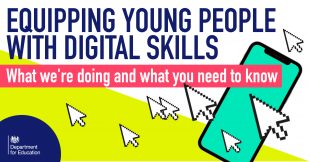
Making sure young people can pick up the skills they need in an increasingly digital world and preparing them for a wide range of cutting edge jobs is a priority.
That’s why we’re innovating to make sure schools and colleges provide routes for young people to develop these crucial skills.
So, what’s changed to make sure we’re helping young people learn the skills they need?
Digital T Levels
Digital T Levels are high-quality, work-focussed alternatives to A levels for young people once they've completed their GCSEs.
The first digital T Level was launched in September 2020 and the remaining two will be available from September 2021. These qualifications will become one of main routes through which a young person can enter the digital sector.
Digital T Levels have been developed in collaboration with leading digital employers like Fujitsu and Amazon. Every T Level includes a substantial industry placement with an employer focused on developing the practical and technical skills required for that occupation.
Completing a Digital T Level provides numerous opportunities for students, including progression into roles in software design and development – such as web, game and mobile app development – in addition to further study or a higher apprenticeship.
Programmes for digital provision
We are also investing £2.5 billion in the National Skills Fund.
This fund will help adults to train and gain the valuable skills they need to improve their job prospects. It will support the immediate economic recovery and future skills needs by boosting the supply of skills that employers require, including important digital skills.
This investment is helping fund the following:
- Level 3 Adult Offer - From April 2021, any adult aged 24 and over who wants to achieve their first full level 3 qualification, which is equivalent to an advanced technical certificate or diploma, or 2 full A levels, will be able to access hundreds of fully-funded courses. Qualifications are specifically available in digital skills.
- Skills Bootcamps - Skills Bootcamps offer free, flexible courses of just 12 to 16 weeks. They give people the opportunity to fast-track to an interview with a local employer. Skills boot camps are available to develop digitals skills including software development, digital marketing and data analytics.
Across the country, the government is also establishing high-quality institutes of technology (IoTs).
IoTs are collaborations between further education (FE) providers, universities and employers. They specialise in delivering higher technical education with a focus on science, technology engineering and maths (STEM) subjects, including digital.
IoTs focus on the specific technical skills needs required in their area. They provide employers with a skilled workforce and students with a clear route to technical employment. Nine IoTs are already open to learners this academic year.
We’re supporting better STEM teaching. Measures undertaken by the department to support STEM teaching include, Isaac Physics (an online platform materials designed to support students transition from GCSE through sixth form to university), a range of support for teacher training, an £84 million programme to improve computing education, and the Teaching for Mastery programme in mathematics.
The work of the National Centre for Computing Education is improving computing teachers’ subject knowledge with nearly 30,000 teachers now engaged, across almost 10,000 primary and more than 3,600 secondary schools.
Increased take up of STEM subjects
More young people are taking STEM subjects at university than ever before, according to statistics published by UCAS last month.
Research by the British Computing Society shows that since 2011, there has been an unprecedented growth in students opting to take on STEM subjects such as Computer Science, Engineering, Chemistry, Physics and Biology. This includes a 400% increase in acceptances for students wishing to go on to study Artificial Intelligence courses at university.
Acceptances into computer science courses have risen by almost 50%, from 20,420 in 2011 to 30,090 in 2020; and acceptances to engineering courses are up 21% from 25,995 in 2011 to 31,545 in 2020. This is driven by an increase in demand from UK 18-year-olds, suggesting the impact early STEM uptake in schools is having on higher education.
Improving the quality of science teaching and increasing the number of young people that study science subjects is important if we are to address the STEM skills shortage and support the UK economy to grow.